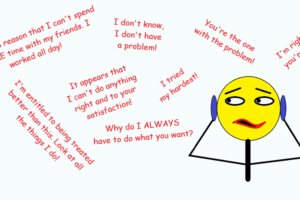
Relationships
Not every relationship is successful; not every relationship will or should make it to “the finish line”. And what is the finish line, anyway?
There are obvious red flags that everyone recognizes as major problems in relationships, for example, infidelity, domestic abuse or an addiction to drugs, alcohol, gambling, shopping or pornography.
For the relationships that don’t “go the distance” and don’t end because of a red flag issue, there will likely be more subtle behaviors (relationship shift) that cause a relationship to dissolve. Some describe this as “the relationship just doesn’t feel good” or “I feel like something has changed in my relationship”. Only you know when a relationship is over. There may be no big event that causes a relationship to be over. More frequently it is when many “small”, seemingly inconsequential events build upon each other.
Not recognizing the subtle relationship shifts in a relationship, ends in a slide. Individuals within the relationship can then choose to work on the relationship or just end it. Delaying either working on or ending the relationship means you can never have happiness with someone else.
Subtle Relationship Shifts
1. Conflict
You may think a relationship with lots of conflict is heading toward extinction. Not necessarily. Sometimes arguing means there may still be some interest in getting the other person to understand a different point of view.
More alarming for a relationship is when you no longer argue at all. It means you may have gotten to a place as a couple where you don’t even care enough about each other, or the relationship, to disagree.
2. Absence
A healthy amount of space and alone time is important in most relationships. However, there are many different types of absences in a relationship that aren’t healthy. For example, when one or both want to “take a break” not only from each other, but from their family responsibilities as well. They may be beginning to fantasize the single life.
There can also be the absences when a couple doesn’t want to be in the same room as each other or when you leave the house when your significant other is on their way home.
3. Intimacy
All couples have their own unique way of sharing intimacy. Intimacy can be anything from sexual intercourse to simply holding hands or getting up with the crying baby at 2 a.m. All couples go through cycles of sometimes more and sometimes less intimacy.
Problems arise when intimacy is used as a weapon within a relationship. For example, “No sex unless you add me to the title on the car.” Another example is when one person demonstrates a significant disinterest in intimacy and refuses to talk about their disinterest.
4. Sharing
In healthy relationships, when there is good news, “I just got a promotion!”, or bad news “I was just laid off!”, you will seek out your significant other. You want their support in good times and in bad.
But in other relationships it may never occur to you to share good or bad news, or anything else with your significant other. This is something you do with other family or friends. This is one of those slow-moving examples of disconnection and withdrawal in the relationship.
5. Life Goals
Some relationships can appear to be great except for shared goals. You may be compatible educationally, financially and sexually, but if one person wants children and the other person doesn’t, problems are sure to arise. There are things that can be compromised on, for example, what vehicle to purchase, but having or not having children isn’t negotiable.
When you figure this out, sometimes it is just easier for both to end the relationship. Why make the other person miserable when you know you will not change your mind on a serious issue?
6. It is Over
If one or both of you has starting thinking, “What would it be like if I wasn’t in this relationship?”, the relationship is sliding away. This thought will take on a life form of its own.
Every time you start fantasizing about a different life, the relationship part of your brain dies. This isn’t one or two times of just saying, “I am done”, it is detesting the idea of negotiation or compromise.
7. Sabotage
You want out of the relationship. As far as you are concerned the relationship is dead with no hope of being put on life support. You just want OUT. However, you don’t want to be seen as a “bad person”, the one who initiates the separation or divorce.
So, you begin creating unpleasant situations that will force the other person into being the “bad guy”, the one who says the relationship is over.
8. Rationalization
There are many reasons people choose to stay in an unhealthy relationship, for example, financial, children, the house, etc. This is especially true if you are so caught up with day-to-day life that you don’t even notice “the problem” until it is too late.
However, you may only be staying in the relationship because of the fear of dating again, or the fear of being alone. Perhaps you have heard the phrase, “better the devil you know.” That is not a reason to stay!
9. Laughter
In the beginning of a relationship, there are oh so many things that the other person did that was cute and endearing. Somehow, your significant other could always cheer you up with their ridiculously bad jokes. But somewhere along the way, those cute little behaviors aren’t cute anymore. As a matter of fact, they are now annoying and irritating.
It may get to the point where everything seems like a “joke” and nothing gets taken seriously anymore. Making it worse? Their favorite saying is, “Can’t you take a joke?”
10. Seeking Help
This is very similar to the topic of having different goals. If one or both of you are clear there is a problem in the relationship, but only one person wants to go for counseling, couples counseling is unlikely to be successful.
Not only does that represent a fundamental impasse in perspectives about how and whether the relationship can be saved, but it also means that there is not joint motivation.
Take Away Point
Identify these “under the radar” subtle relationship shift signs of problems in a relationship, and you might have a chance of salvaging your relationship. Two or more of these subtle situations, and you have a serious problem on your hands! Remember, if a relationship is failing, it requires two, not one, to work on it.
Thank you so much for reading this blog. If you enjoyed the content, please check out other blogs at:
https://relationshipsrelearned.com/staging/9213/1/my-blog/
https://rvingnomads.com/blog/
You can now view my books that are available on my Amazon Authors Page.
To be notified of future posts, please enter your email address and click on the Subscribe button.








